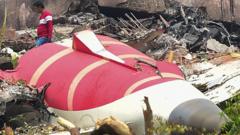India is in the spotlight as its Aircraft Accident Investigation Bureau (AAIB) deliberates on whether to send the flight data and cockpit voice recorders from the grisly Air India crash overseas for further examination. Last Thursday's accident involved a London-bound Boeing 787-8 Dreamliner, tragically resulting in the death of at least 270 individuals, mainly passengers, shortly after takeoff from Ahmedabad.
While there were hints in the media that the black boxes would be shipped internationally, the civil aviation ministry confirmed that no definitive decision has been made yet. The AAIB will assess various factors including technical, safety, and security considerations before reaching a conclusion.
The Enhanced Airborne Flight Recorders (EAFRs), which encompass both the flight data and cockpit audio recordings, have already been retrieved from the crash site. Their sophisticated function allows investigators to reconstruct the last moments of the flight and pinpoint the accident's cause.
Reports indicate that some damage occurred to the recorders in the resultant fire, potentially complicating data extraction in India. Captain Kishore Chinta, a former AAIB investigator, suggested that one recorder might be dispatched to the US for data comparison with the National Transportation Safety Board (NTSB).
Amidst this situation, Air India's chairman revealed one of the aircraft’s engines was newly installed, while the other had been scheduled for servicing in December. Following the crash, the airline undertook safety checks on 26 of its 33 Boeing 787 aircraft, all of which were declared safe to operate.
The aviation regulator in India has mandated additional safety measures for the Boeing 787 fleet, and Air India will be cutting back flights on 16 international routes while suspending three destinations until mid-July to facilitate enhanced pre-flight checks.





















